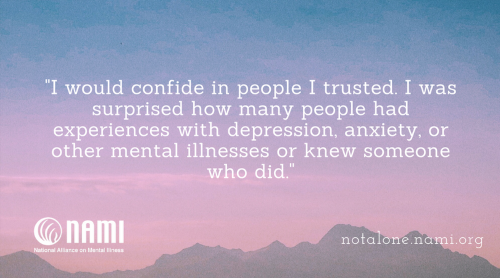November 16, 2017
By Chris Crutchley

My name is Chris Crutchley. I’m 37 years old and I was diagnosed with Bipolar Disorder as a 20-year-old college junior. I’ve never publicly told my story. In college I feared my peers would view me as a freak. As a professional I worry disclosure can cost me opportunities. This is why I’m speaking out. I want to be part of the solution that ends the stigma.
My first child was born this week. Honestly, I thought that would have happened in my late twenties. There was also a time I didn’t think fatherhood would happen at all. I hope my story can help those who suffer from mental illness and enlighten others to the challenges we face receiving adequate care.
In college I was a two-sport athlete on academic scholarship. I had my insecurities but was confident I would succeed in life. I had no history of mental illness and did not understand anxiety as I do today. I’ve replayed the events that lead to my 2001 hospitalization over and over in my mind throughout the years. I spent that summer training for the upcoming season. I wasn’t drinking or doing drugs. I didn’t feel any emotional distress. For whatever reason I stopped sleeping at night.
It was a gradual decline into psychosis over a matter of days. There were moments of clarity followed by delusion. I now can tell you my hallucinations were extensions of normal thoughts I had prior to suffering sleep deprivation. At times I tried to warn my family something was wrong. At other times I would convince them I was fine. They brought me to a hospital within a week of my First Episode Psychosis.
I read an article on FEP or First Episode Psychosis which is what I experienced in 2001. The article talks about the chances for the individual to have a successful future largely depends on how quickly the patient gets care after the first psychotic episode. It shocks me that the average time for a US citizen to get care after their first episode is 74 weeks (that could be due to a number of factors I guess). In Europe it’s 2 to 7 weeks. I am extremely fortunate to have family members who were responsive to my medical needs and sought care immediately when I couldn’t do it myself. Not everyone is that fortunate.
When I returned to school for my junior year I left both athletic teams I competed on to focus on my health. I was turning 21 and I had strict orders to stay away from alcohol and keep a 10pm bedtime. I was on very strong medication that made it difficult to follow conversation and “feel” typical emotions. I felt like a hollow shell of my former self.
I made the decision to own my story. I would confide in people I trusted. I was surprised how many people had experiences with depression, anxiety, or other mental illnesses or knew someone who did. I read books on mental illness and emotional intelligence so I could recognize my symptoms while they were happening.
I made it through college and graduate school but was unprepared emotionally to make the transition to functioning adult. In my mid-twenties and early thirties, I suffered a handful of setbacks that landed me in the hospital. After graduation my insurance lapsed and I stopped taking my medication or seeing a psychiatrist due to the expense. I know realize that medication compliance is critical to proper care. Not everyone has the ability to pay for the prescriptions written for them.
There was a time when I cut myself because I had been sent home from an emergency room after stating I am bipolar with suicidal thoughts. I returned to the same emergency room with a cut on my wrist and was admitted. That was my last hospitalization and I’m not proud of that moment in my life. I just want to illustrate how desperate a mental illness can leave you and how difficult it can be to get care.
I was 30 and given a month leave from work. I decided to make it count. I made a list of all my insecurities. I worked on everyone until I felt comfortable. On my list I questioned if I should be a father someday. Now I look at my 4-day old daughter and feel completely blessed. I want to help others who believe having a mental illness means they won’t have a productive career and shouldn’t start a family of their own.
Submit To The NAMI Blog
We’re always accepting submissions to the NAMI Blog! We feature the latest research, stories of recovery, ways to end stigma and strategies for living well with mental illness. Most importantly: We feature your voices.
LEARN MORE